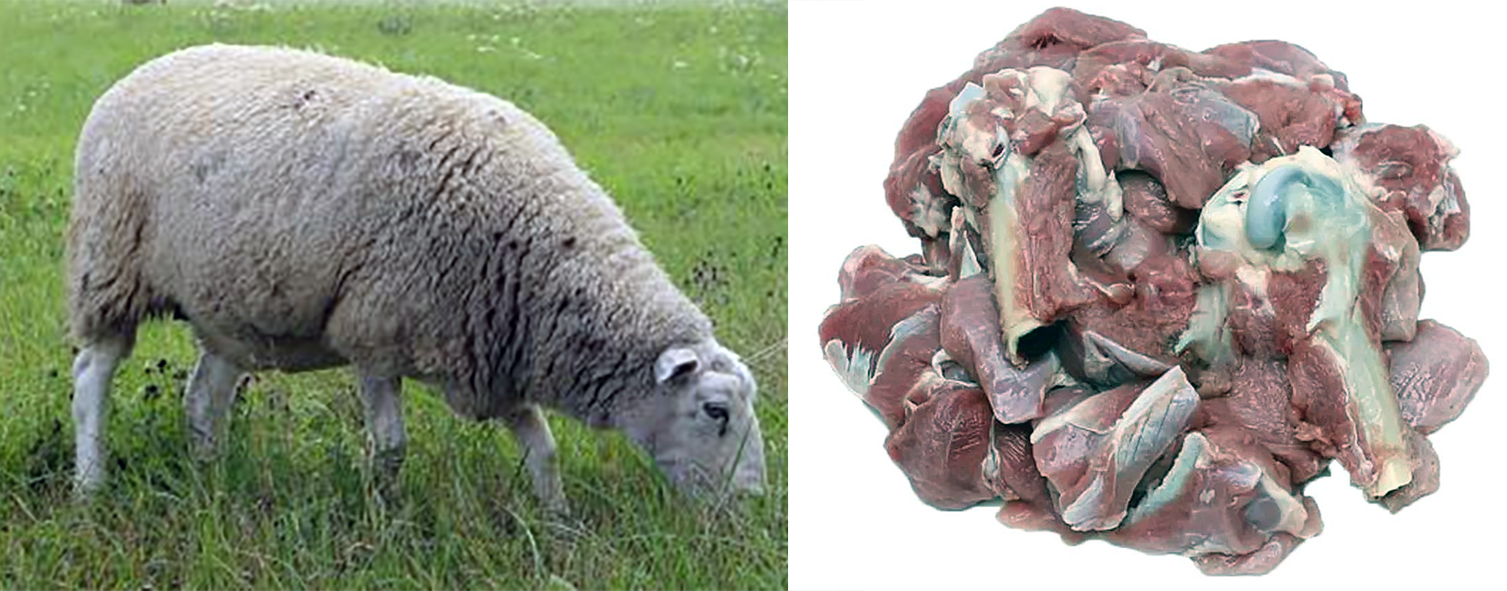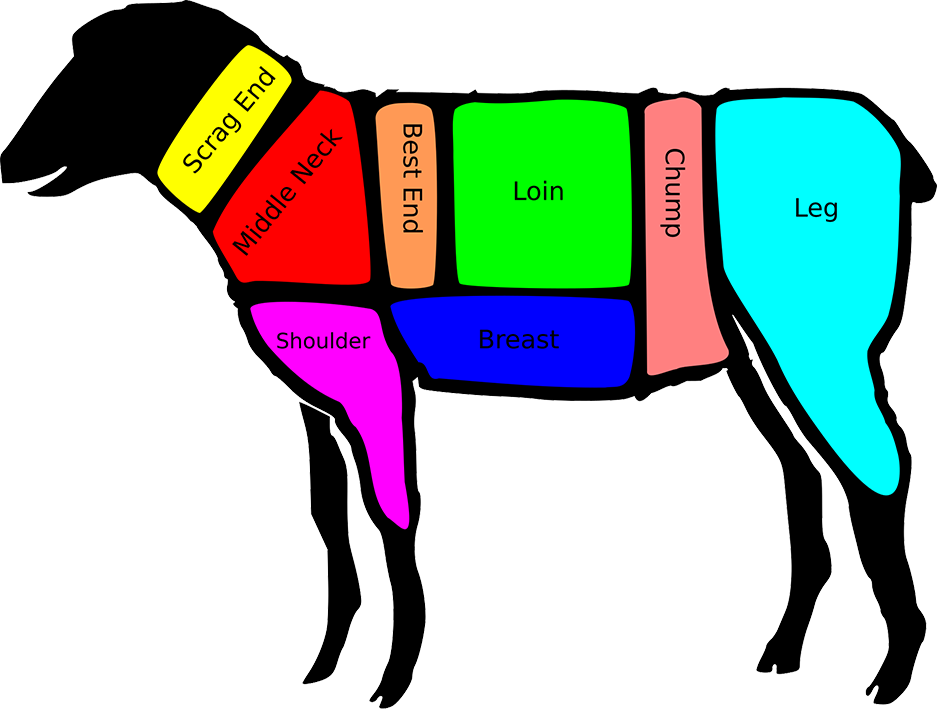FabulousFusionFood's Mutton-based Recipes Home Page
 Mature sheep (mutton) and a selection of mutton cuts.
Mature sheep (mutton) and a selection of mutton cuts.
Welcome to FabulousFusionFood's Mutton-based Recipes Page — The recipes presented here are all based on sheep meat. Mutton represents a mature sheep (Ovis aries) which is more than two years old.
Hogget is term for a sheep of either sex having no more than two permanent incisors in wear, or its meat. In the UK, it means animals that are 11 to 24 months old. Still common in farming usage and among speciality butchers, it is now a rare term in British, Australian and New Zealand supermarkets, where meat of all sheep less than two years old tends to be called 'lamb'.
Mutton — the meat of a female (ewe) or castrated male (wether) sheep having more than two permanent incisors in wear. Thin strips of fatty mutton can be cut into a substitute for bacon called macon. In Northern Europe, mutton and lamb feature in many traditional dishes, including those of Iceland, Norway and Western Europe, including those of the United Kingdom, particularly in the western and northern uplands, Scotland and Wales.
Sheep are most likely descended from the wild mouflon of Europe and Asia, with Iran being a geographic envelope of the domestication centre. One of the earliest animals to be domesticated for agricultural purposes, sheep are raised for fleeces, meat (lamb, hogget or mutton), and milk. A sheep's wool is the most widely used animal fibre, and is usually harvested by shearing. In Commonwealth countries, ovine meat is called lamb when from younger animals and mutton when from older ones; in the United States, meat from both older and younger animals is usually called lamb. Sheep continue to be important for wool and meat today, and are also occasionally raised for pelts, as dairy animals, or as model organisms for science.
Sheep meat and milk were one of the earliest staple proteins consumed by human civilization after the transition from hunting and gathering to agriculture. Sheep meat prepared for food is known as either mutton or lamb, and approximately 540 million sheep are slaughtered each year for meat worldwide. "Mutton" is derived from the Old French moton, which was the word for sheep used by the Anglo-Norman rulers of much of the British Isles in the Middle Ages. This became the name for sheep meat in English, while the Old English word sceap was kept for the live animal. Throughout modern history, "mutton" has been limited to the meat of mature sheep usually at least two years of age; "lamb" is used for that of immature sheep less than a year.
Cuts of Mutton (UK, Canada, and other Commonwealth countries):
 Cuts of Mutton:
Cuts of Mutton:Scrag end (of neck) — stewing
Middle neck — braising, stewing
Best End (of neck) — roasting, stewing, braising
Loin (including chops, racks and saddle) — roasting, frying, braising
Chump (and chump chops) — frying
Barnsley chop, a large double loin chop — frying
Leg (gigot in Scotland) including leg steaks — roasting, frying
Shank — braising
Shoulder — roasting Breast — braising
Offal — typically tongue, liver, heart, stomach, sweetbreads, testicles, intestines and kidneys
The alphabetical list of all the mutton-based recipes on this site follows, (limited to 100 recipes per page). There are 118 recipes in total:
Page 1 of 2
| A Bengal Currie Origin: Britain | Drisheen Origin: Ireland | Methi Kalia (Spicy Fenugreek Meat) Origin: Bangladesh |
| Aaloo Gosht (Mutton Curry with Potatoes) Origin: Pakistan | Drisheen Sausage Origin: Ireland | Monnchelet (Veal or Mutton Stew with Herbs and Egg Liaison) Origin: England |
| Afrikaanse Yakhni Origin: South Africa | Durban Bunny Chow Origin: South Africa | Mrs Beeton Boiled Neck of Mutton Origin: Britain |
| Ak-Ni Korma Origin: India | Durban-style Mutton Curry with Potatoes and Dumplings Origin: South Africa | Mutton and Coconut Cream Curry Origin: Fusion |
| Aliter assaturas (Roast Meats, Another Way) Origin: Roman | Elumas Curry (Mutton Curry) Origin: Sri Lanka | Mutton and Potato Pies Origin: Britain |
| Aliter assaturas (Roast Meats, Another Way) Origin: Roman | Francatelli Boiled Neck of Mutton Origin: Britain | Mutton and Turnip Pie Origin: England |
| Anglo-Indian Ball Curry Origin: Anglo-Indian | Gheema Origin: British | Mutton Broth Origin: Britain |
| Anglo-Indian Mutton Dakbungalow Origin: Anglo-Indian | Goat Curry with Potatoes Origin: Pakistan | Mutton Cutlets with Mashed Potatoes Origin: Britain |
| Aruban Curried Mutton Origin: Aruba | Goat Meat Suya Origin: Nigeria | Mutton in the Burmese Style Origin: Fusion |
| Assaturas in collare (Of Roast Neck) Origin: Roman | Haggis Origin: Scotland | Mutton Madras Origin: India |
| Aurangabadi Naan Qaliya Origin: India | Haggis Balls with Mustard-whisky Sauce Origin: Scotland | Mutton Pilau Origin: India |
| Bakari Riha (Mutton Curry) Origin: Maldives | Haggis in the Hole Origin: Scotland | Mutton Rendang Origin: Indonesia |
| Baked Haggis with Whisky Cumberland Sauce Origin: Scotland | Haggis Kheema with Tattie Rotis Origin: Fusion | Mutton Rissole Origin: British |
| Barley Kail Origin: Scotland | Haggis Koftas Origin: Scotland | Mutton Toad-in-the-Hole Origin: British |
| Bengali Hot Dry Meat Curry Origin: India | Hara Mircha (Bell Pepper Curry) Origin: India | Osban (Offal Sausages) Origin: Libya |
| Bo-Kaap Kerrie (Cape Malay Curry) Origin: South Africa | Individual Mutton Pies Origin: England | Packet and Tripe Origin: Ireland |
| Bonava (Meat and Potatoes Stew) Origin: Mauritania | Irish Farm Broth Origin: Ireland | Pakistani Seekh Kebab Origin: Pakistan |
| Brochettes de Boeuf (Beef Kebabs) Origin: Rwanda | Ius Frigidum in Ovifero (Cold Sauce for Wild Sheep) Origin: Roman | Pastai Penfro (Pembrokeshire Pies) Origin: Welsh |
| Brunei Murtabak (Meat Rotis) Origin: Brunei | Ius in Ovifero Fervens (Hot Sauce for Wild Sheep) Origin: Roman | Pea Soup and Meat Origin: Guinea-Bissau |
| Cape Malay Mutton and Dhal Curry Origin: South Africa | Jamaican Mutton and Lime Leaf Origin: Jamaica | Pilau Mouton de Comores (Comorian Mutton Pilau) Origin: Comoros |
| Cape Malay Mutton Curry Origin: South Africa | Kadhai Gosht Origin: Pakistan | Plat Songhay (Songhay Dish) Origin: Mali |
| Cawl Wstrys Bro Gŵyr (Gower Peninsula Oyster Broth) Origin: Welsh | Kaeng Phet Pet Yang (Thai Red Roast Duck Curry) Origin: Thailand | Potato and Mutton Soup Origin: Scotland |
| Cig Dafad Mewn Dull Cig Moch (Welsh Mutton Ham) Origin: Welsh | Kari Kambing (Mutton or Goat Curry) Origin: Indonesia | Poullaille farcie (Stuffed Poultry) Origin: France |
| Coes Cig Dafad wedi Rhostio gyda Llysiau, Mêl Grug a Phrŵns (Roast Leg of Mutton with Heather Honey and Prunes) Origin: Welsh | Keema Style Haggis Curry Origin: Scotland | Real Irish Stew Origin: Ireland |
| Colonial Goose II Origin: New Zealand | Khoresht-e Loobia (Stewed Mutton with String Beans) Origin: Iran | Red Oil Greens Origin: Liberia |
| Couscous à la Nigérienne (Niger-style Couscous) Origin: Niger | Lampara Curry Origin: Sri Lanka | Rezala (Lamb Curry) Origin: Bangladesh |
| Cullen Broth Origin: Scotland | Leksour (Mauritanian-style Pancakes with Sauce) Origin: Mauritania | Saka-saka (Mutton and Cassava Leaf Stew) Origin: Guinea |
| Curried Mutton Origin: Britain | M'borokhé (Peanut Sauce with Spinach) Origin: Mali | Samish Mirchi Soup (Mulligatawny Soup) Origin: India |
| Curried Mutton Stew Origin: South Africa | Madras-style Leftovers Curry Origin: India | Sanger Yena (Offal Sausages) Origin: Aruba |
| Curried Neck of Mutton Potjie Origin: Namibia | Mafé Origin: Senegal | Scotch Pie Origin: Scotland |
| Dakbungalow Chicken Curry Origin: Anglo-Indian | Malaysian Lamb Rendang Origin: Malaysia | Scots Mutton Pies Origin: Scotland |
| Dakhine Origin: Senegal | Manx Broth for a Wedding Origin: Manx | Sheikh Kebab Origin: India |
| Dhaba Mutton Curry Origin: India | Manx Mutton Hot-pot Origin: Manx | |
| Dounguouri Soko (Meat Stew with White Beans) Origin: Niger | Massaman Mutton Curry Origin: Thailand |
Page 1 of 2